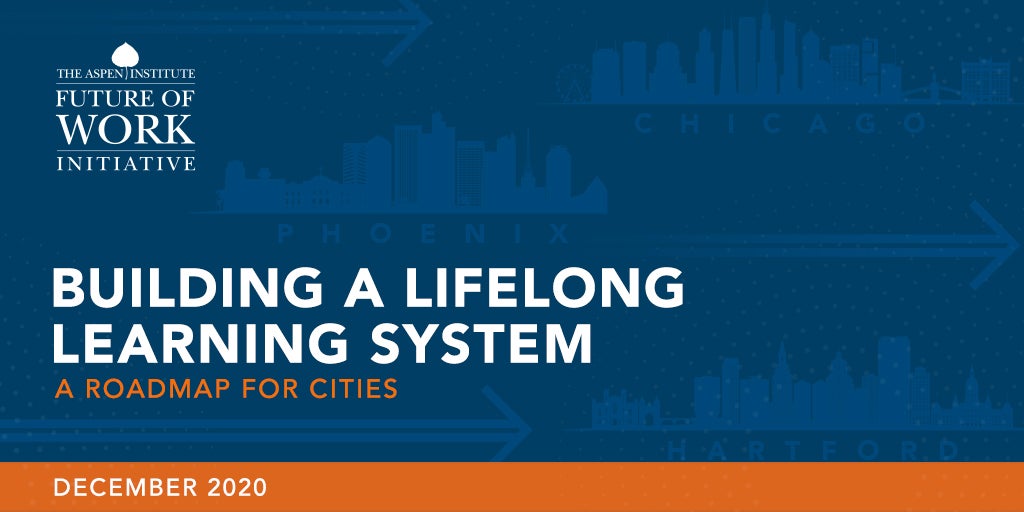Cities are well positioned to build lifelong learning systems that can help workers pursue education and training throughout their careers. With the power to convene and connect stakeholders, including employers and training providers, highlight skill and job needs, and conduct evaluations of existing programs, city governments can address many of the challenges outlined in this report. To date, however, cities have not played a prominent role in helping adult residents access or understand what education and training options are available.
This blog post is an excerpt from the Future of Work Initiative’s report, Building A Lifelong Learning System: A Roadmap for Cities, and is part of a series of blogs highlighting the recommendations made in the report—the concrete steps mayors and city leaders can take to build integrated and effective lifelong learning systems. The Future of Work Initiative is grateful to the Cognizant U.S. Foundation for providing financial support for this project and publication.
The job market in cities is always evolving, and thus the skills necessary to secure a job are similarly changing. In moving from a siloed set of education and training providers to a more connected system, it will be important to invest in evaluating the effectiveness of programs. Efforts like The Workforce Data Quality Initiative at the U.S. Department of Labor supports the development of state-level administrative databases that integrate workforce and education data. The Hartford Data Collaborative, convened by Capital Workforce Partners, is also building a system of data sharing across youth-serving nonprofits that support workforce development and other needs of opportunity youth with support from the Hartford Foundation and Annie E. Casey Foundation.
Part of ensuring effectiveness of these programs will require cities that seek to build inclusive lifelong learning systems to take steps to address the ongoing equity challenges that exist in post-secondary education and training. In particular, to address racism and ensure equitable access to programs, there is a need for more fully assessing the extent to which programs are effective in reaching low-income Black and Latinx residents and others with systemic barriers to employment and providing the services necessary to make participation and completion possible. While strategies must constantly evolve, there are several clear areas where immediate engagement is needed.
Offer Flexible Training Options
The first is working with institutional partners from across the city to develop flexible training options that are responsive to different schedules, learning styles, and ability to access in-person vs. digital training options. An example of flexibility in training options can include stackable credentials, which can allow learners to start and stop training on their own terms. As post-secondary institutions around the country have discovered, diversifying options beyond standard, in-person, business hours training makes learning accessible to a broader group of students with a diversity of backgrounds.
Promote Employer Flexibility
Employer flexibility is also important. Even when students are able to attend classes, they frequently need support from their current employer. This could be a new or different work schedule, access to company IT to complete assignments or attend classes, and at times, the ability to take a leave of absence to focus on training without losing one’s job or income. While mayors’ offices cannot mandate that employers become more flexible, they can encourage a move in this direction through outreach and engagement.
Expand Access to Technology
Providing access to learning tools can also benefit workers pursuing post-secondary training. As the Chicago Public Library has shown, expanding internet access, loaning hotspots for home use, and providing laptops and other devices gives people the opportunity to undertake training and education opportunities. The Deputy Mayor for Lifelong Learning can direct city resources, or work with the philanthropic community, to support broader digital access, either through the public library system, the parks and recreation department, or another city agency.
Provide Wraparound Services
Providing access to wraparound services, like child care, transportation, stable and secure housing, food assistance, mental health services, and sufficient income while training, is critical to ensuring that workers without savings or family support can complete training programs. In some cases, this can be as simple as a free bus or metro pass from the city. In others, it will require building formal connections between existing health and welfare service providers and various parts of the city’s training apparatus. In San Antonio, Project Quest has built a community training model that provides in-class training along with intensive support services tied to immediate learner needs “to help participants overcome financial and personal barriers to skill acquisition.” Unfortunately, these models are not easy to replicate and require additional public-private funding strategies given the resources necessary to provide this type of support.
Evaluating the outcomes of specific programs can be expensive and time-consuming but data on program completion, job outcomes, and wage increases are essential to helping those who might participate in programs determine whether the investment of resources and time is worthwhile, and that programs are inclusive. An example of local workforce development efforts being informed by program evaluations can be found in Hartford where the Hartford Foundation has funded evaluations as part its Career Pathways Initiative.


